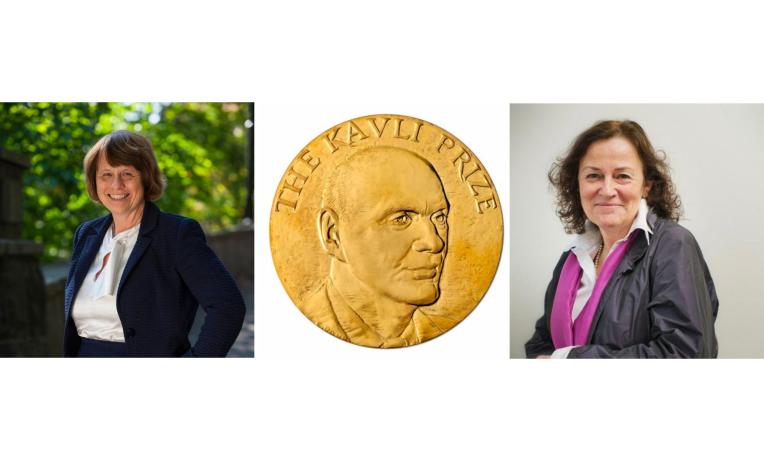
Ewine van Dishoeck today won the 2018 Kavli Prize for Astrophysics for her work to reveal the processes within interstellar clouds that produce stars and planets. Christine Petit was a joint winner of the Kavli Neuroscience Prize for her work on the molecular and neural mechanisms of hearing. She shares the prize with A. James Hudspeth and Robert Fettiplace.
Ewine van Dishoeck demonstrated how molecules form and evolve during the transformation of a cloud into a star system. She also uncovered significant structures within the rings of dust and gas surrounding young stars, the birthplace of planets and comets.
"Professor Van Dishoeck's research on the chemistry of the universe has transformed virtually every aspect of the subject. She has advanced a subject that was once regarded as a small activity on the fringes of mainstream astrophysics, and brought it to the forefront of astronomy as a whole,” said Robert Kennicutt, member of the astrophysics prize committee.
Ewine van Dishoeck was awarded an ERC Advanced Grant in 2012 for her work at Leiden University in the Netherlands. The grant, worth 2.5 million euro, supports a five-year research project investigating Astrochemistry and the Origin of Planetary Systems. Its aim is to bring the link between interstellar chemistry and solar system and exo-planetary research to a new level.
Christine Petit explored the genetics of hereditary deafness in humans and identified more than twenty genes that are required for hearing and inner ear development.
"[The Neuroscience prizewinners] have provided fundamental new insights into how our inner ear transforms sound into electrical signals - the basis of hearing - and have unveiled genetic and molecular mechanisms underlying hearing loss," said Ole Petter Ottersen, head of the neuroscience prize committee.
Professor Christine Petit was awarded an ERC Advanced Grant in 2012 for her work at France's Pasteur Institute. The grant, worth 2.5 million euro, supports a five-year research project to solve the puzzle of the operating auditory hair bundle. Understanding of the mechanisms underlying the functioning of the hair bundle will pave the way for the developments in deafness diagnosis and counselling.
The Kavli Prizes, awarded every two years by the Norwegian Academy of Science and Letters, recognize scientists for pioneering advances in our understanding of existence at its biggest, smallest, and most complex scales. Presented in the fields of astrophysics, nanoscience and neuroscience, each of three international prizes consists of 1 million USD. Laureates are chosen by committees whose members are recommended by six of the world’s most renowned science societies and academies.
Kavli prize website
About the ERC
The European Research Council, set up by the European Union in 2007, is the premiere European funding organisation for excellent frontier research. Every year, it selects and funds the very best, creative researchers of any nationality and age, to run projects based in Europe.The ERC has three core grant schemes: Starting Grants, Consolidator Grants and Advanced Grants. The Synergy Grant scheme was re-launched in 2017. To date, the ERC has funded some 8,000 top researchers at various stages of their careers, and over 50,000 postdocs, PhD students and other staff working in their research teams. The ERC also strives to attract top researchers from anywhere in the world to come to Europe. Key global research funding bodies in the United States, China, Japan, Brazil and other countries have concluded agreements to provide their researchers with opportunities to temporarily join ERC grantees' teams.
The ERC is governed by an independent body, the Scientific Council, led by the ERC President, Professor Jean-Pierre Bourguignon. The ERC has an annual budget of €1.8 billion for the year 2018. The overall ERC budget from 2014 to 2020 is over €13 billion, as part of the Horizon 2020 programme, for which European Commissioner for Research, Innovation and Science Carlos Moedas is responsible.

